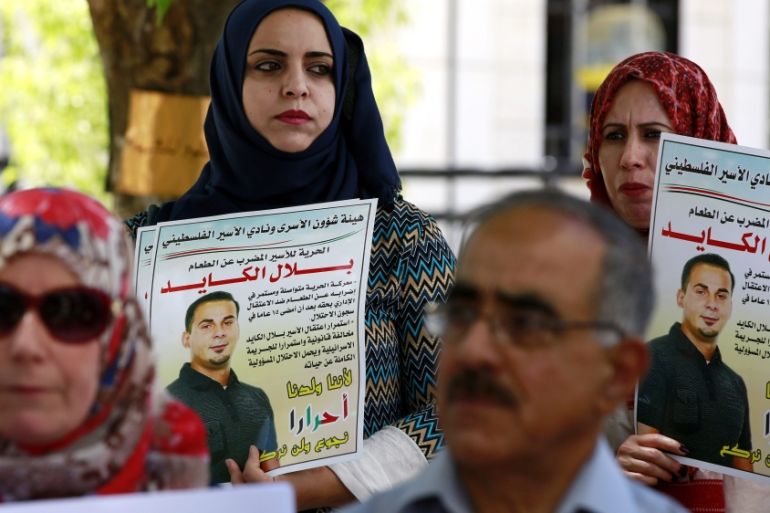Palestinian leftists on hunger strike in Israeli jails
Dozens of prisoners go on hunger strike to support Bilal Kayed, a Palestinian detainee held without charge or trial.

Dozens of Palestinian prisoners in Israeli jails have launched a hunger strike in solidarity with Bilal Kayed, a fellow detainee who has been hospitalised in Israel as his health plummets because of his own, extended hunger strike.
|
|
Kayed, a 35-year-old from the Nablus area of the occupied West Bank, has been on hunger strike for 37 days to protest against being held without charge or trial.
Keep reading
list of 4 itemsUS sanctions two RSF commanders as fighting escalates in Sudan’s Darfur
The Lost Souls of Syria – Part 1
Is the US shipping weapons to Israel tacit support for its war on Gaza?
He launched his strike on June 15, the day he was scheduled to be released from an Israeli prison after more than 14 years behind bars since 2001.
Kayed had been charged with being a member of the Popular Front for the Liberation of Palestine (PFLP), a political party with an armed wing banned by Israel.
Just hours before his scheduled release, Kayed was informed that he was being placed under administrative detention, a practice in which Israel jails Palestinians for renewable six-month intervals on “secret evidence” without trial or charge.
Laith Abu Zeyad, an international advocacy officer at Addameer Prisoner Support Network, a West Bank-NGO offering supporting to Palestinian prisoners, said that Israeli prison authorities have pressured Kayed to accept a release deal that includes being deported to neighbouring Jordan. Kayed has refused the offer.
Farah Bayadsi, Kayed’s lawyer, said he was shackled to his bed when she visited him earlier this week.
“Israeli security guards are monitoring him 24 hours a day in the hospital,” she told Al Jazeera. “His body is very weak, but his mood is strong and he is committed to striking until he achieves freedom.”
Bayadsi added that his family has not been allowed to visit him since he was hospitalised.
Neither the Israeli army spokesperson nor the Israel Prison Services replied to Al Jazeera’s requests for a comment.
Owing to pre-existing health problems, Kayed’s health has plummeted rapidly and he is in a “critical” stage, Abu Zeyad told Al Jazeera.
“He lost consciousness more than once. He’s only drinking water and isn’t taking any vitamins or supplements.”
READ MORE: How many Palestinians are imprisoned by Israel?
Sources close to PFLP and local media outlets said at least 37 prisoners have joined the hunger strike since Sunday.
Most of the hunger strikers are members of the PFLP, although some are affiliated with the nationalist Fatah party, the Islamic Jihad group and the leftist People’s Party.
More arrests
There are at least 7,000 Palestinians in prisons across Israel and the occupied Palestinian territory. From that total, at least 750 are presently held as administrative detainees, according to Addameer. The organisation estimates that 40 percent of all Palestinian men have been jailed by Israel.
Speaking of Israel’s rise in arrests since tensions started to soar in October, Addameer’s Abu Zeyad added: “The Israeli occupation is using administrative detention in a systematic way to oppress the Palestinian population.”
Israel arrested at least 18 Palestinians in areas across the West Bank on Thursday, just a day after another 20 were arrested in pre-dawn raids, local media reported.
READ MORE: Meet the youngest Palestinian female in Israeli prison
Alaa Tartir, programmes director of Al Shabaka: The Palestinian Policy Network, argued that hunger strikes “challenge the structures of oppression and mechanisms of control” in Israeli prisons.
Speaking to Al Jazeera, Tartir claimed the Palestinian leadership, including the West Bank-based Palestinian Authority, has “failed” the political prisoners by not doing enough to support them.
“Yet rays of hope come from prisoners themselves and, despite the very limited options and tools they have, they are able to inspire, transform their persistence into victories and [remain] steadfast in front of all the hardships, torture and difficulties.”
|
|